 |
yumapro
25.10-4
YumaPro SDK
|
 |
yumapro
25.10-4
YumaPro SDK
|
Management of a hierarchy of (name, value) pairs. More...

Data Structures | |
| struct | ncx_var_t |
| struct of NCX user variable mapping for yangcli More... | |
Typedefs | |
| typedef ncx_var_t *(* | var_getvar_fn_t) (const xmlChar *varname, uint32 varlen, void *cookie, status_t *res) |
| Get Variable Callback. More... | |
Enumerations | |
| enum | var_type_t { VAR_TYP_NONE , VAR_TYP_LOCAL , VAR_TYP_CONFIG , VAR_TYP_GLOBAL , VAR_TYP_SYSTEM , VAR_TYP_QUEUE } |
| different types of variables supported More... | |
| enum | var_side_t { ISRIGHT , ISLEFT } |
| values for isleft parameter in var_check_ref More... | |
Functions | |
| void | var_free (ncx_var_t *var) |
| Free a ncx_var_t struct. More... | |
| void | var_clean_varQ (dlq_hdr_t *varQ) |
| Clean a Q of ncx_var_t. More... | |
| void | var_clean_type_from_varQ (dlq_hdr_t *varQ, var_type_t vartype) |
| Clean all entries of one type from a Q of ncx_var_t. More... | |
| status_t | var_set_str (runstack_context_t *rcxt, const xmlChar *name, uint32 namelen, const val_value_t *value, var_type_t vartype) |
| Find and set (or create a new) global user variable. More... | |
| status_t | var_set (runstack_context_t *rcxt, const xmlChar *name, const val_value_t *value, var_type_t vartype) |
| Find and set (or create a new) global user variable. More... | |
| status_t | var_set_str_que (dlq_hdr_t *varQ, const xmlChar *name, uint32 namelen, const val_value_t *value) |
| Find and set (or create a new) global user variable. More... | |
| status_t | var_set_que (dlq_hdr_t *varQ, const xmlChar *name, const val_value_t *value) |
| Find and set (or create a new) Q-based user variable. More... | |
| status_t | var_set_move_que (dlq_hdr_t *varQ, const xmlChar *name, val_value_t *value) |
| Find or create and set a Q-based user variable. More... | |
| status_t | var_set_move_que_global (dlq_hdr_t *varQ, const xmlChar *name, val_value_t *value) |
| Find or create and set a Q-based user variable. More... | |
| status_t | var_set_move (runstack_context_t *rcxt, const xmlChar *name, uint32 namelen, var_type_t vartype, val_value_t *value) |
| Find and set (or create a new) global user variable. More... | |
| status_t | var_set_sys (runstack_context_t *rcxt, const xmlChar *name, const val_value_t *value) |
| Find and set (or create a new) global system variable. More... | |
| status_t | var_set_from_string (runstack_context_t *rcxt, const xmlChar *name, const xmlChar *valstr, var_type_t vartype) |
| Find and set (or create a new) global user variable from a string value instead of a val_value_t struct. More... | |
| status_t | var_unset (runstack_context_t *rcxt, const xmlChar *name, uint32 namelen, var_type_t vartype) |
| Find and remove a local or global user variable. More... | |
| status_t | var_unset_que (dlq_hdr_t *varQ, const xmlChar *name, uint32 namelen, xmlns_id_t nsid) |
| Find and remove a Q-based user variable. More... | |
| val_value_t * | var_get_str (runstack_context_t *rcxt, const xmlChar *name, uint32 namelen, var_type_t vartype) |
| Find a global user variable. More... | |
| val_value_t * | var_get (runstack_context_t *rcxt, const xmlChar *name, var_type_t vartype) |
| Find a local or global user variable. More... | |
| var_type_t | var_get_type_str (runstack_context_t *rcxt, const xmlChar *name, uint32 namelen, boolean globalonly) |
| Find a user variable; get its var type. More... | |
| var_type_t | var_get_type (runstack_context_t *rcxt, const xmlChar *name, boolean globalonly) |
| Get the var type of a specified var name. More... | |
| val_value_t * | var_get_str_que (dlq_hdr_t *varQ, const xmlChar *name, uint32 namelen, xmlns_id_t nsid) |
| Find a global user variable in a varQ. More... | |
| val_value_t * | var_get_que (dlq_hdr_t *varQ, const xmlChar *name, xmlns_id_t nsid) |
| Find a Q-based user variable in q varQ. More... | |
| ncx_var_t * | var_get_que_raw (dlq_hdr_t *varQ, xmlns_id_t nsid, const xmlChar *name) |
| Find a Q-based user variable; return the var struct instead of just the value. More... | |
| val_value_t * | var_get_local (runstack_context_t *rcxt, const xmlChar *name) |
| Find a local user variable. More... | |
| val_value_t * | var_get_local_str (runstack_context_t *rcxt, const xmlChar *name, uint32 namelen) |
| Find a local user variable, count-based name string. More... | |
| status_t | var_check_ref (runstack_context_t *rcxt, const xmlChar *line, var_side_t side, uint32 *len, var_type_t *vartype, const xmlChar **name, uint32 *namelen, val_value_t **foundval) |
| Check if the immediate command sub-string is a variable reference. More... | |
| val_value_t * | var_get_script_val (runstack_context_t *rcxt, obj_template_t *obj, val_value_t *val, const xmlChar *strval, boolean istop, status_t *res) |
| Create or fill in a val_value_t struct for a parameter assignment within the script processing mode. More... | |
| val_value_t * | var_get_script_val_ex (runstack_context_t *rcxt, obj_template_t *parentobj, obj_template_t *obj, val_value_t *val, const xmlChar *strval, boolean istop, val_value_t *fillval, status_t *res) |
| Create or fill in a val_value_t struct for a parameter assignment within the script processing mode Allow external values. More... | |
| val_value_t * | var_check_script_val (runstack_context_t *rcxt, obj_template_t *obj, const xmlChar *strval, boolean istop, boolean handleEscapedCharacters, cli_xml_buffer_fn_t cbfn, status_t *res) |
| Create a val_value_t struct for a parameter assignment within the script processing mode, if a var ref is found. More... | |
| void | var_cvt_generic (dlq_hdr_t *varQ) |
| Cleanup after a yangcli session has ended. More... | |
| ncx_var_t * | var_find (runstack_context_t *rcxt, const xmlChar *varname, xmlns_id_t nsid) |
| Find a complete var struct for use with XPath. More... | |
| ncx_var_t * | var_find_global (runstack_context_t *rcxt, const xmlChar *varname, uint32 namelen, xmlns_id_t nsid) |
| Find a complete var struct for use with XPath or data templates. More... | |
| ncx_var_t * | var_get_first (runstack_context_t *rcxt, boolean islocal) |
| Find the first local or global variable. More... | |
| ncx_var_t * | var_get_next (ncx_var_t *curvar) |
| Find the next local or global variable. More... | |
| const xmlChar * | var_get_name (const ncx_var_t *curvar) |
| Get the name string for the specified variable. More... | |
| var_type_t | var_get_vartype (const ncx_var_t *curvar) |
| Get the variable type for the specified variable. More... | |
| void | var_init (void) |
| Init the var module. More... | |
| void | var_set_getvar_cb (var_getvar_fn_t getcb, void *cookie) |
| Set the getvar callback function used for data templates. More... | |
| void * | var_get_getvar_cb_cookie (void) |
| Get the cookie parameter for the getvar callback function used for data templates. More... | |
| var_getvar_fn_t | var_get_getvar_cb (void) |
| Get the getvar callback function used for data templates. More... | |
| boolean | var_string_is_var_expr (const xmlChar *varstring, uint32 varlen, boolean *plainvar) |
| Check if the string is a variable reference. More... | |
| status_t | var_replace_subtree (runstack_context_t *rcxt, val_value_t *val) |
| Replace all the simple node variable usage with the var value. More... | |
Management of a hierarchy of (name, value) pairs.
THe names are NcxIdentifier types and the values are val_value_t structures or strings
| typedef ncx_var_t *(* var_getvar_fn_t) (const xmlChar *varname, uint32 varlen, void *cookie, status_t *res) |
Get Variable Callback.
var_getvar_fn_t
Callback function for retrieval of a variable binding within a data template
| varname | variable name requested | |
| varlen | length of varname string | |
| cookie | registered app-specific cookie parameter | |
| [out] | res | address of return status
|
| enum var_side_t |
| enum var_type_t |
different types of variables supported
| status_t var_check_ref | ( | runstack_context_t * | rcxt, |
| const xmlChar * | line, | ||
| var_side_t | side, | ||
| uint32 * | len, | ||
| var_type_t * | vartype, | ||
| const xmlChar ** | name, | ||
| uint32 * | namelen, | ||
| val_value_t ** | foundval | ||
| ) |
Check if the immediate command sub-string is a variable reference.
If so, return the (vartype, name, namelen) tuple that identifies the reference. Also return the total number of chars consumed from the input line.
E.g.,
* $foo = get-config filter=@filter.xml *
| rcxt | runstack context to use | |
| line | command line string to expand | |
| side | TRUE if left hand side of an expression FALSE if right hand side ($1 type vars allowed) | |
| [out] | len | address of number chars parsed so far in line
|
| [out] | vartype | address of return variable Q type
|
| [out] | name | address of string start return val
|
| [out] | namelen | address of name length return val
|
| [out] | foundval | address of found variable value return val
|


| val_value_t * var_check_script_val | ( | runstack_context_t * | rcxt, |
| obj_template_t * | obj, | ||
| const xmlChar * | strval, | ||
| boolean | istop, | ||
| boolean | handleEscapedCharacters, | ||
| cli_xml_buffer_fn_t | cbfn, | ||
| status_t * | res | ||
| ) |
Create a val_value_t struct for a parameter assignment within the script processing mode, if a var ref is found.
See yangcli documentation for details on the script syntax
| rcxt | runstack context to use | |
| obj | expected object template NULL and will be set to NCX_BT_STRING for simple types | |
| strval | string value to check | |
| istop | TRUE if calling from top level assignment An unquoted string is the start of a command FALSE if calling from a parameter parse An unquoted string is just a string | |
| handleEscapedCharacters | in a double-quoted string (only!), translate * " \\, \", \n, and \t ". * | |
| cbfn | callback function to use | |
| [out] | res | address of status result
|
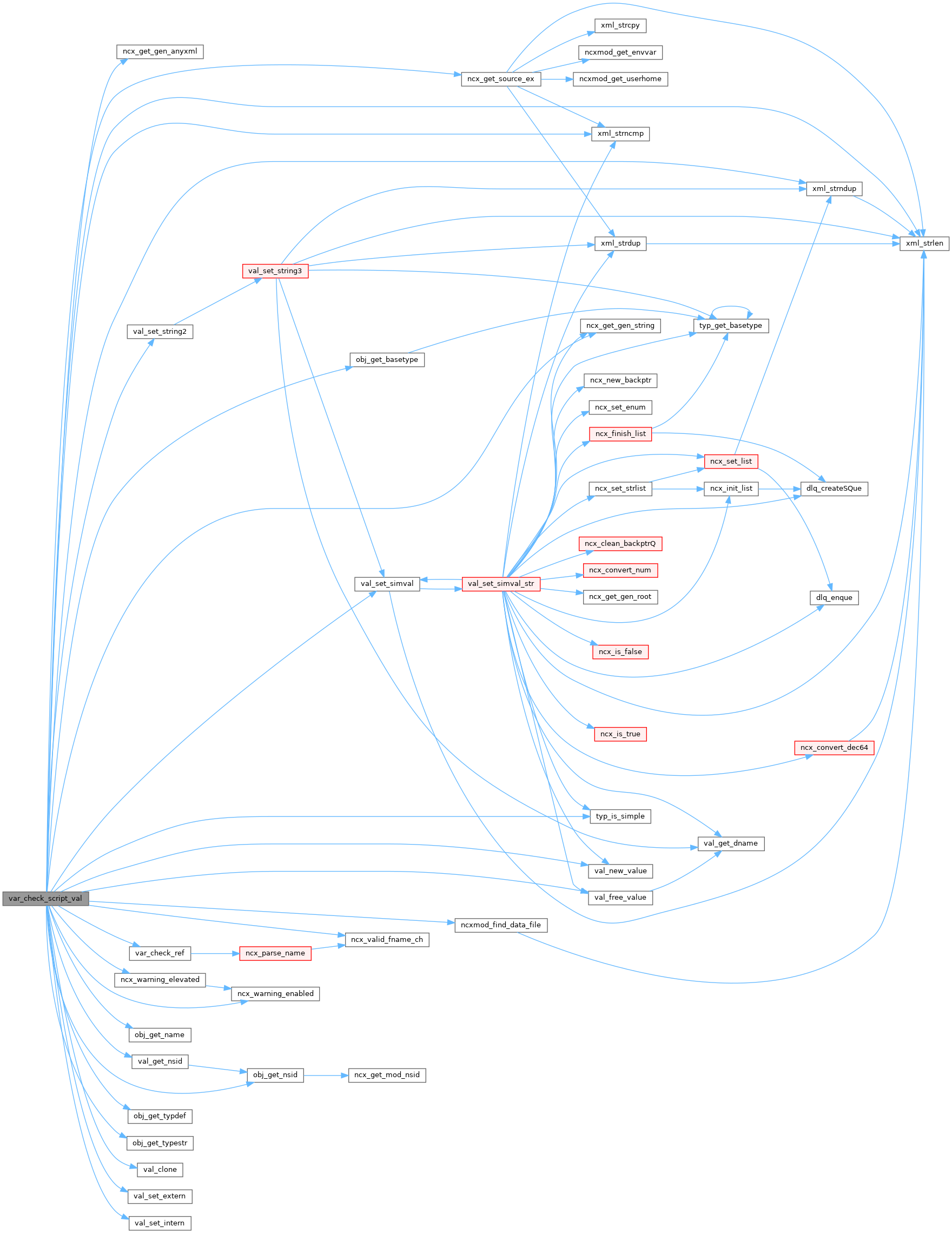
| void var_clean_type_from_varQ | ( | dlq_hdr_t * | varQ, |
| var_type_t | vartype | ||
| ) |
Clean all entries of one type from a Q of ncx_var_t.
| varQ | Q of var structs to free |
| vartype | variable type to delete |

| void var_clean_varQ | ( | dlq_hdr_t * | varQ | ) |
Clean a Q of ncx_var_t.
| varQ | Q of var structs to free |

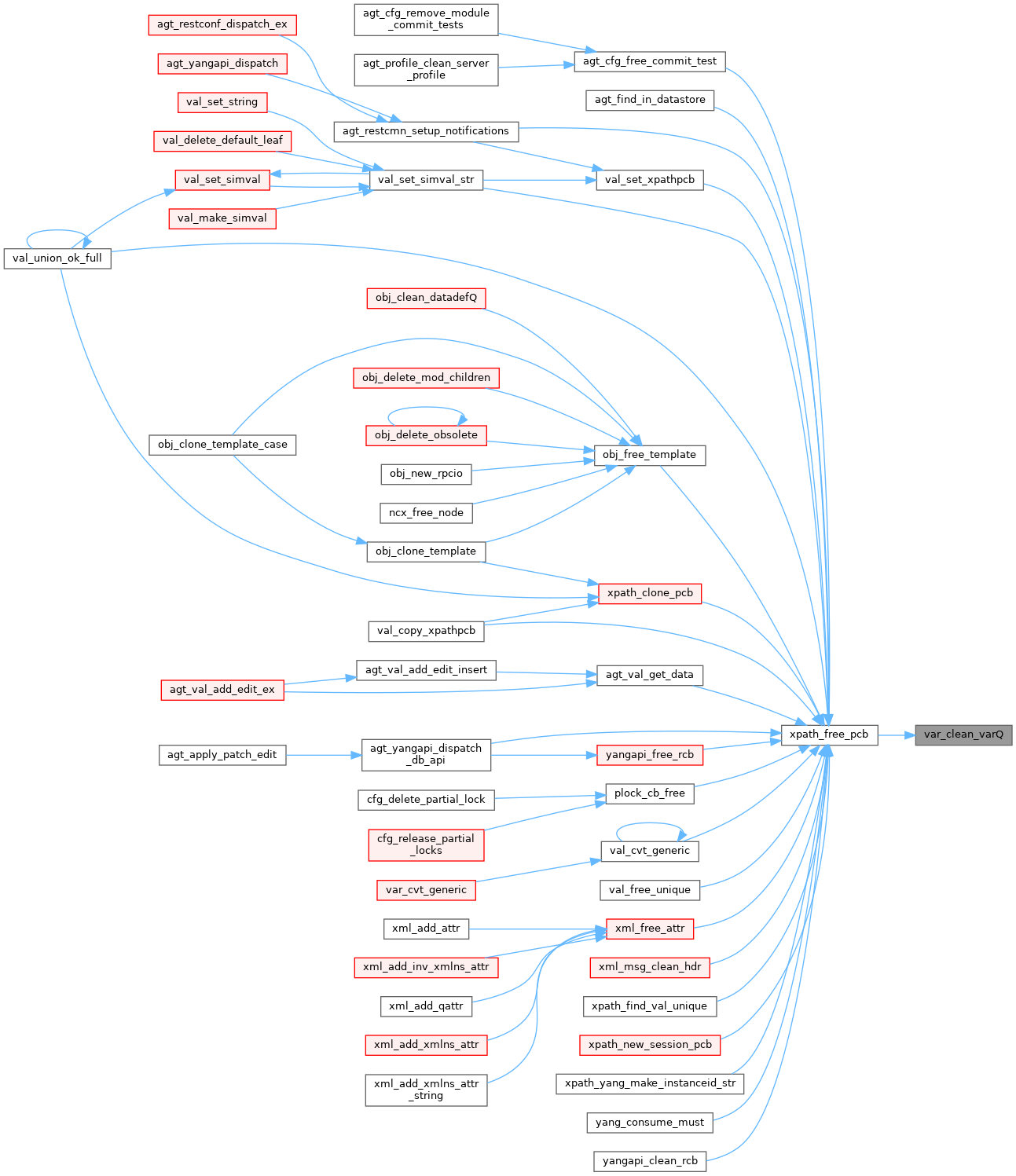
| void var_cvt_generic | ( | dlq_hdr_t * | varQ | ) |
Cleanup after a yangcli session has ended.
| varQ | Q of ncx_var_t to cleanup and change to generic object pointers |
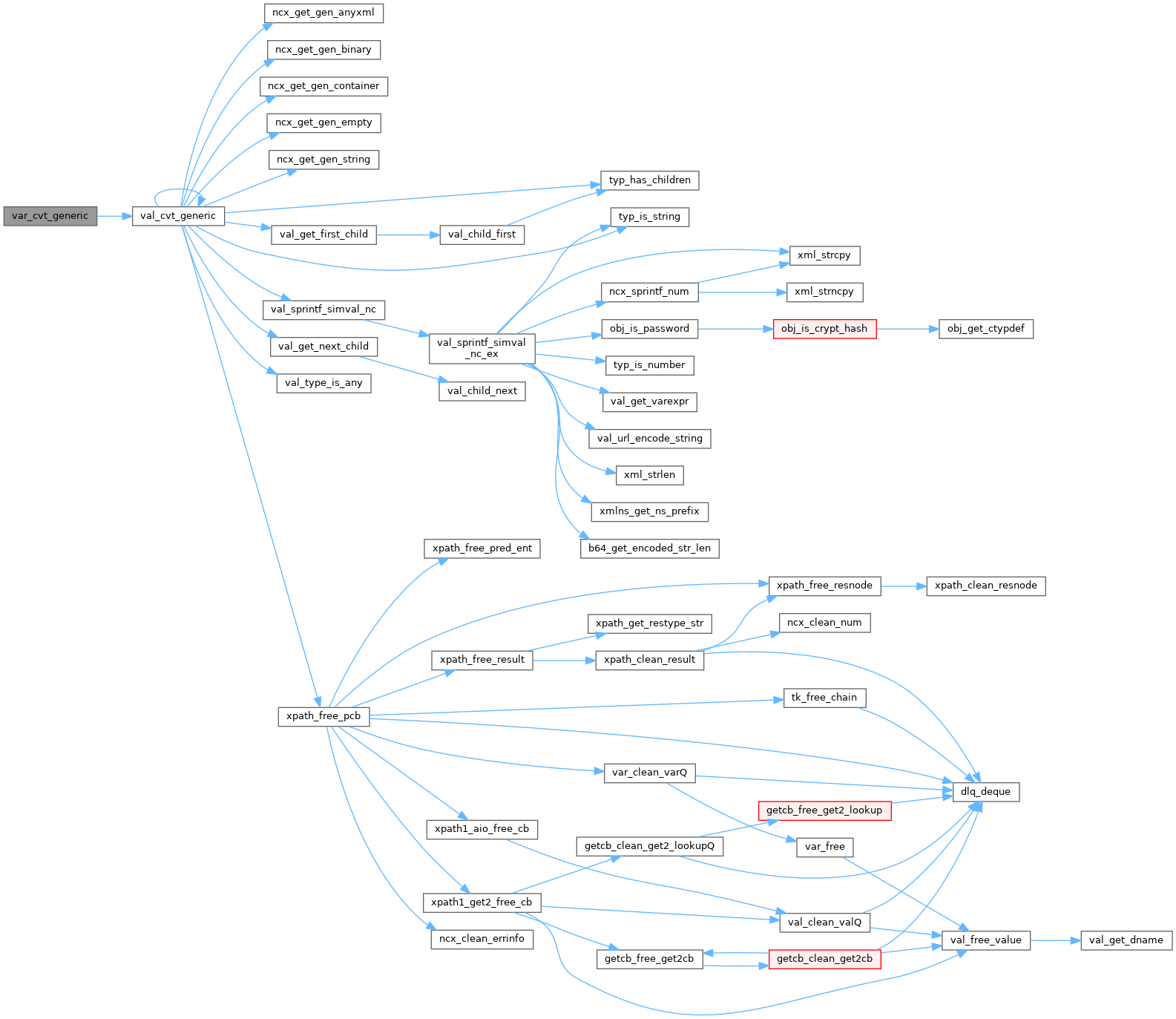

| ncx_var_t * var_find | ( | runstack_context_t * | rcxt, |
| const xmlChar * | varname, | ||
| xmlns_id_t | nsid | ||
| ) |
Find a complete var struct for use with XPath.
| rcxt | runstack context to use |
| varname | variable name string |
| nsid | namespace ID for varname (0 is OK) |

| ncx_var_t * var_find_global | ( | runstack_context_t * | rcxt, |
| const xmlChar * | varname, | ||
| uint32 | namelen, | ||
| xmlns_id_t | nsid | ||
| ) |
Find a complete var struct for use with XPath or data templates.
INPUTS:
| rcxt | runstack context to use |
| varname | variable name string |
| namelen | length of name string |
| nsid | namespace ID for varname (0 is OK) |
| void var_free | ( | ncx_var_t * | var | ) |
Free a ncx_var_t struct.
| var | var struct to free |

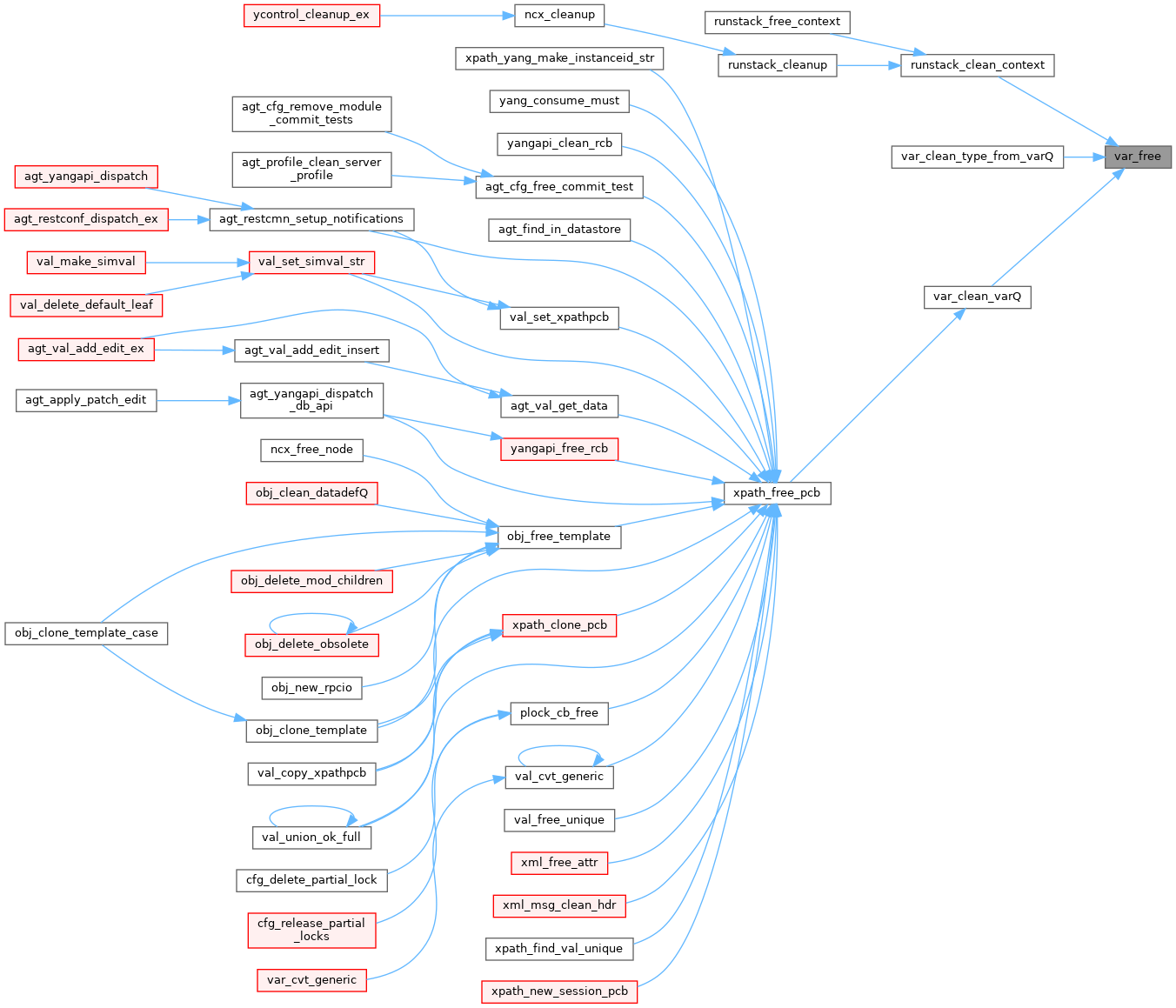
| val_value_t * var_get | ( | runstack_context_t * | rcxt, |
| const xmlChar * | name, | ||
| var_type_t | vartype | ||
| ) |
Find a local or global user variable.
| rcxt | runstack context to use |
| name | var name to set |
| vartype | variable type |

| ncx_var_t * var_get_first | ( | runstack_context_t * | rcxt, |
| boolean | islocal | ||
| ) |
Find the first local or global variable.
| rcxt | runstack context to use |
| islocal | TRUE for local variables FALSE for global variables |

| var_getvar_fn_t var_get_getvar_cb | ( | void | ) |
Get the getvar callback function used for data templates.
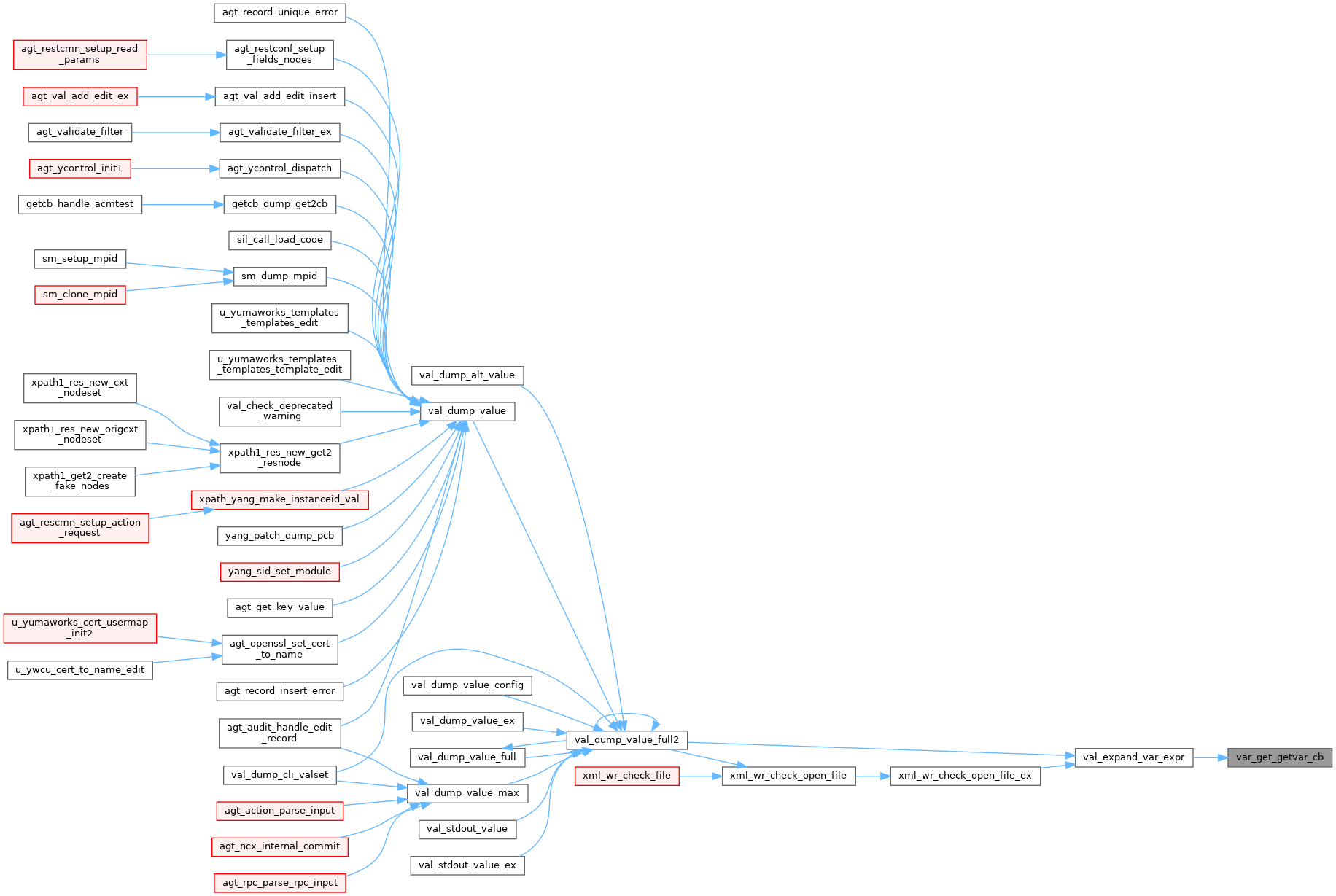
| void * var_get_getvar_cb_cookie | ( | void | ) |
Get the cookie parameter for the getvar callback function used for data templates.
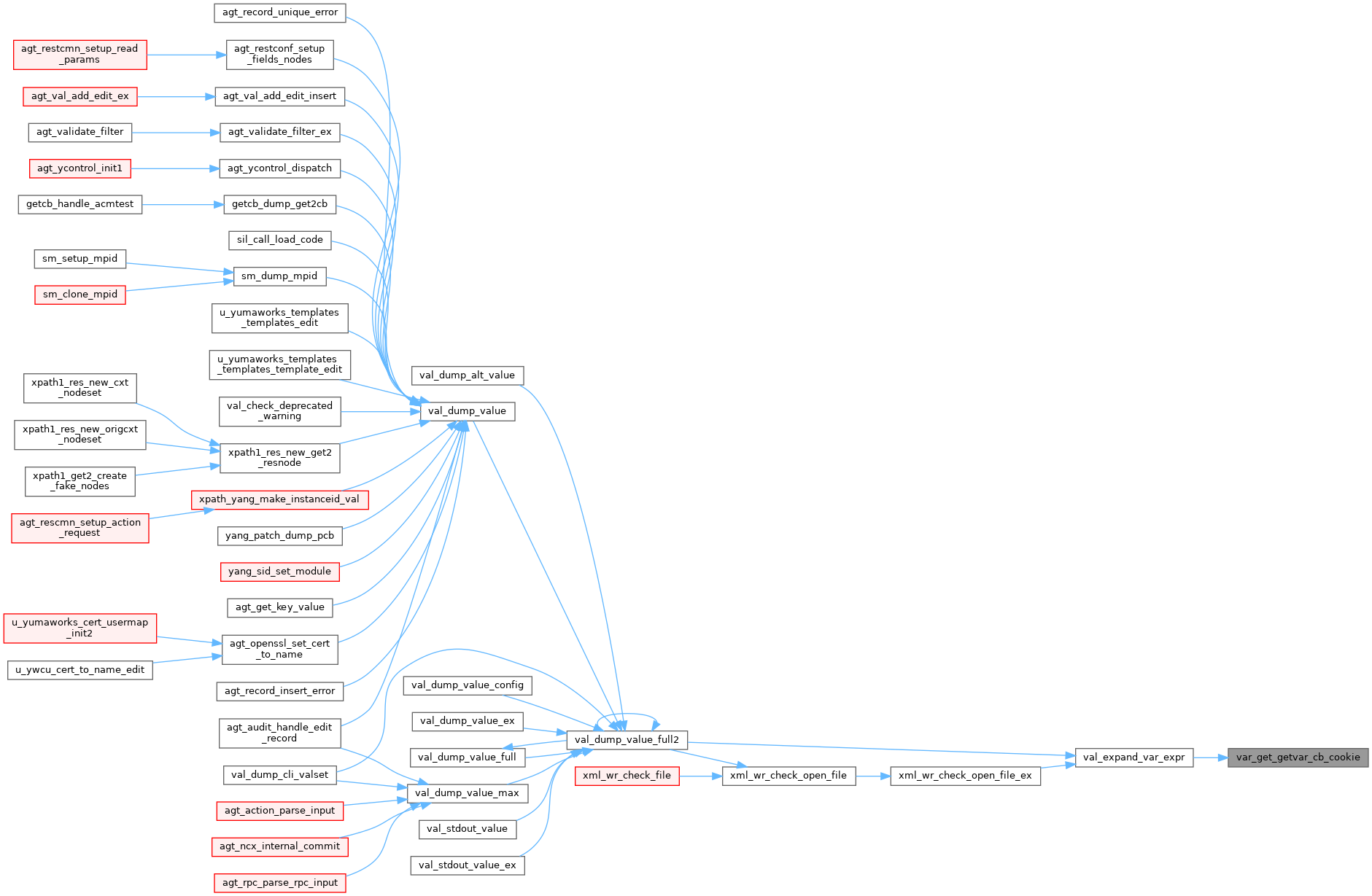
| val_value_t * var_get_local | ( | runstack_context_t * | rcxt, |
| const xmlChar * | name | ||
| ) |
Find a local user variable.
| rcxt | runstack context to use |
| name | var name to get |

| val_value_t * var_get_local_str | ( | runstack_context_t * | rcxt, |
| const xmlChar * | name, | ||
| uint32 | namelen | ||
| ) |
Find a local user variable, count-based name string.
| rcxt | runstack context to use |
| name | var name to get |
| namelen | legth of name string |
| const xmlChar * var_get_name | ( | const ncx_var_t * | curvar | ) |
Get the name string for the specified variable.
| curvar | current var to check |
Find the next local or global variable.
| curvar | current var to check |
| val_value_t * var_get_que | ( | dlq_hdr_t * | varQ, |
| const xmlChar * | name, | ||
| xmlns_id_t | nsid | ||
| ) |
Find a Q-based user variable in q varQ.
| varQ | queue of ncx_var_t to use |
| name | var name to get |
| nsid | namespace ID for name (0 if not used) |

| ncx_var_t * var_get_que_raw | ( | dlq_hdr_t * | varQ, |
| xmlns_id_t | nsid, | ||
| const xmlChar * | name | ||
| ) |
Find a Q-based user variable; return the var struct instead of just the value.
| varQ | queue of ncx_var_t to use |
| nsid | namespace ID for name (0 if not used) |
| name | var name to get |

| val_value_t * var_get_script_val | ( | runstack_context_t * | rcxt, |
| obj_template_t * | obj, | ||
| val_value_t * | val, | ||
| const xmlChar * | strval, | ||
| boolean | istop, | ||
| status_t * | res | ||
| ) |
Create or fill in a val_value_t struct for a parameter assignment within the script processing mode.
See ncxcli.c for details on the script syntax
| rcxt | runstack context to use | |
| obj | expected type template NULL and will be set to NCX_BT_STRING for simple types | |
| val | value to fill in :: val->obj MUST be set NULL to create a new one | |
| strval | string value to check | |
| istop | TRUE (ISTOP) if calling from top level assignment An unquoted string is the start of a command FALSE (ISPARM) if calling from a parameter parse An unquoted string is just a string | |
| [out] | res | address of status result
|
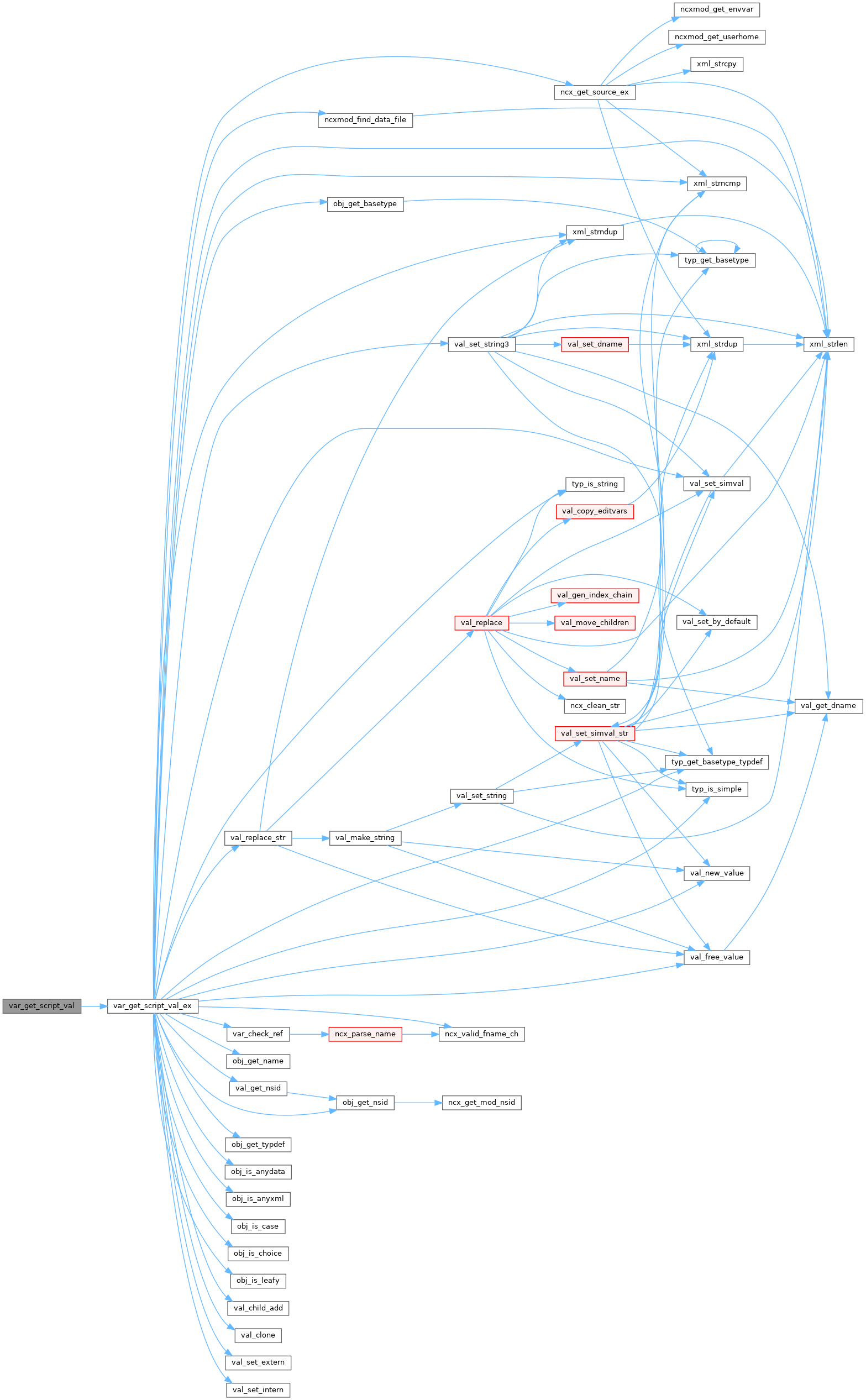
| val_value_t * var_get_script_val_ex | ( | runstack_context_t * | rcxt, |
| obj_template_t * | parentobj, | ||
| obj_template_t * | obj, | ||
| val_value_t * | val, | ||
| const xmlChar * | strval, | ||
| boolean | istop, | ||
| val_value_t * | fillval, | ||
| status_t * | res | ||
| ) |
Create or fill in a val_value_t struct for a parameter assignment within the script processing mode Allow external values.
See ncxcli.c for details on the script syntax
| rcxt | runstack context to use | |
| parentobj | container or list real node parent of 'obj' NULL and will be set to NCX_BT_STRING for simple types | |
| obj | expected type template NULL and will be set to NCX_BT_STRING for simple types | |
| val | value to fill in :: val->obj MUST be set NULL to create a new one | |
| strval | string value to check | |
| istop | TRUE (ISTOP) if calling from top level assignment An unquoted string is the start of a command FALSE (ISPARM) if calling from a parameter parse An unquoted string is just a string | |
| fillval | value from yangcli, could be NCX_BT_EXTERN; used instead of strval! NULL: not used | |
| [out] | res | address of status result
|
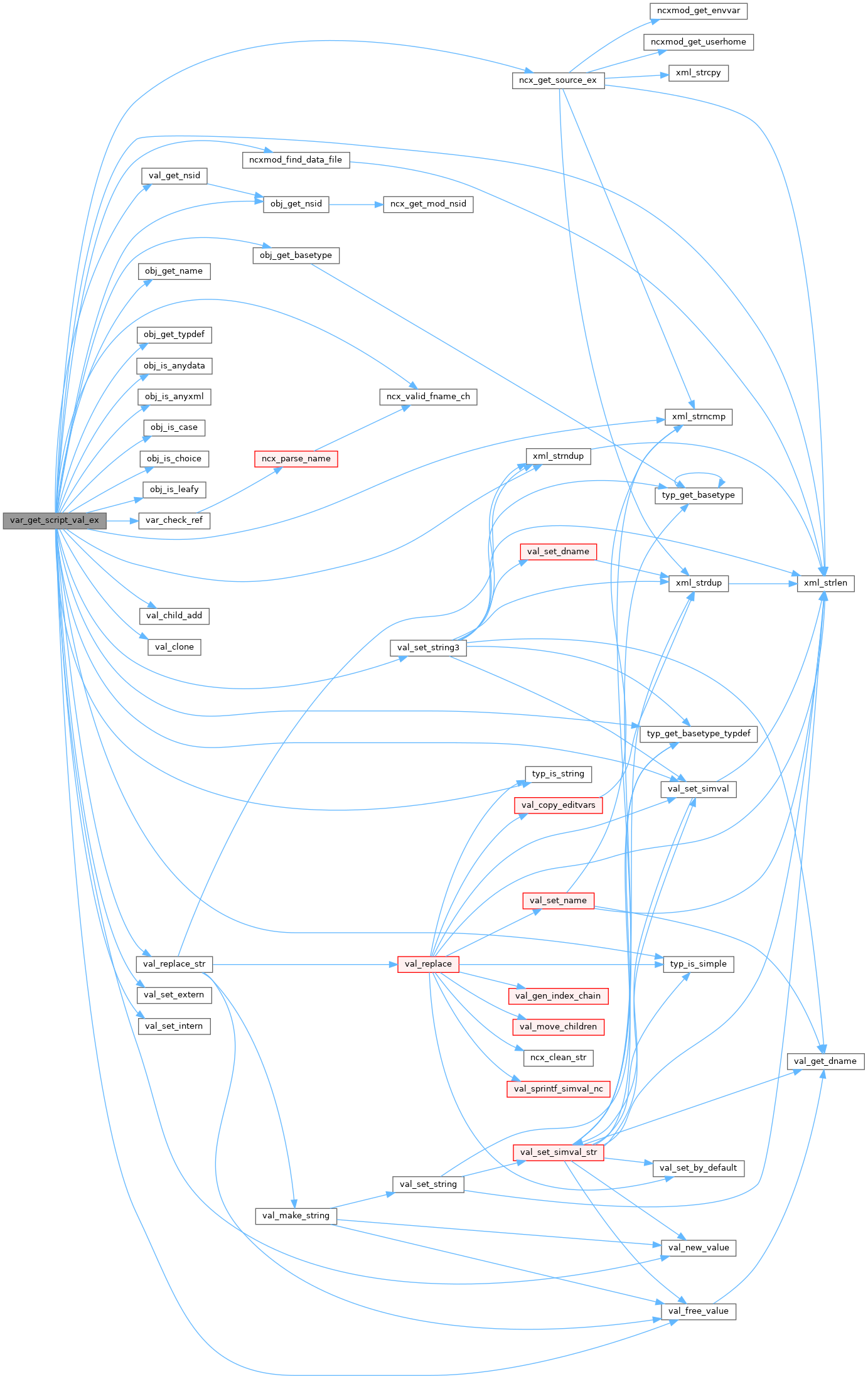

| val_value_t * var_get_str | ( | runstack_context_t * | rcxt, |
| const xmlChar * | name, | ||
| uint32 | namelen, | ||
| var_type_t | vartype | ||
| ) |
Find a global user variable.
| rcxt | runstack context to use |
| name | var name to set |
| namelen | length of name string |
| vartype | variable type |

| val_value_t * var_get_str_que | ( | dlq_hdr_t * | varQ, |
| const xmlChar * | name, | ||
| uint32 | namelen, | ||
| xmlns_id_t | nsid | ||
| ) |
Find a global user variable in a varQ.
| varQ | queue of ncx_var_t to use |
| name | var name to get |
| namelen | length of name |
| nsid | namespace ID for name (0 if not used) |
| var_type_t var_get_type | ( | runstack_context_t * | rcxt, |
| const xmlChar * | name, | ||
| boolean | globalonly | ||
| ) |
Get the var type of a specified var name.
| rcxt | runstack context to use |
| name | var name to get |
| globalonly | TRUE to check only the global Q FALSE to check local, then global Q |

| var_type_t var_get_type_str | ( | runstack_context_t * | rcxt, |
| const xmlChar * | name, | ||
| uint32 | namelen, | ||
| boolean | globalonly | ||
| ) |
Find a user variable; get its var type.
| rcxt | runstack context to use |
| name | var name to get |
| namelen | length of name |
| globalonly | TRUE to check only the global Q FALSE to check local, then global Q |

| var_type_t var_get_vartype | ( | const ncx_var_t * | curvar | ) |
Get the variable type for the specified variable.
| curvar | current var to check |
| void var_init | ( | void | ) |
Init the var module.

| status_t var_replace_subtree | ( | runstack_context_t * | rcxt, |
| val_value_t * | val | ||
| ) |
Replace all the simple node variable usage with the var value.
| rcxt | runstack contect to use |
| val | value subtree to check; expecting container or list |
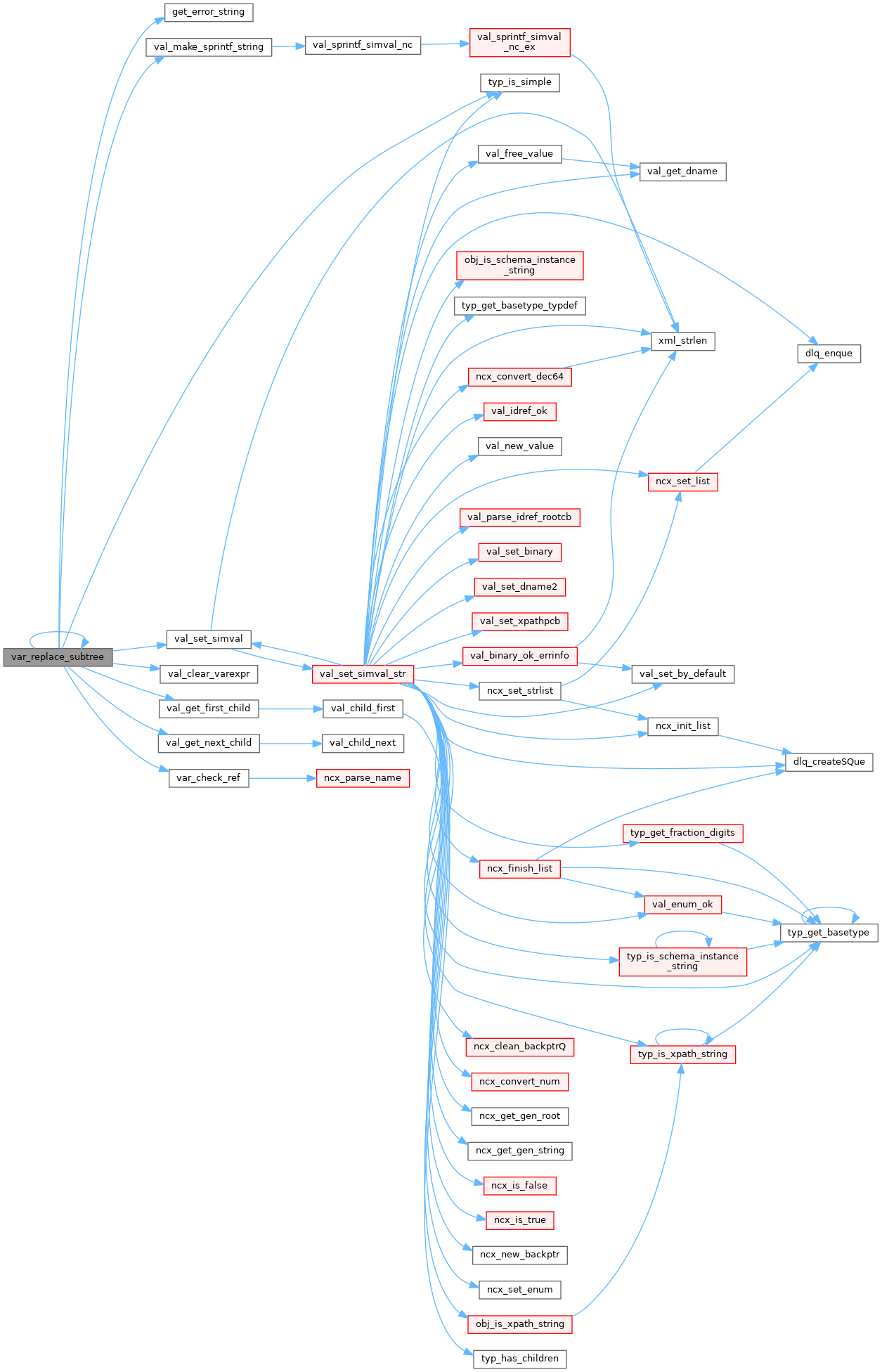

| status_t var_set | ( | runstack_context_t * | rcxt, |
| const xmlChar * | name, | ||
| const val_value_t * | value, | ||
| var_type_t | vartype | ||
| ) |
Find and set (or create a new) global user variable.
| rcxt | runstack context to use to find the var |
| name | var name to set |
| value | var value to set |
| vartype | variable type |

| status_t var_set_from_string | ( | runstack_context_t * | rcxt, |
| const xmlChar * | name, | ||
| const xmlChar * | valstr, | ||
| var_type_t | vartype | ||
| ) |
Find and set (or create a new) global user variable from a string value instead of a val_value_t struct.
| rcxt | runstack context to use to find the var |
| name | var name to set |
| valstr | value string to set |
| vartype | variable type |
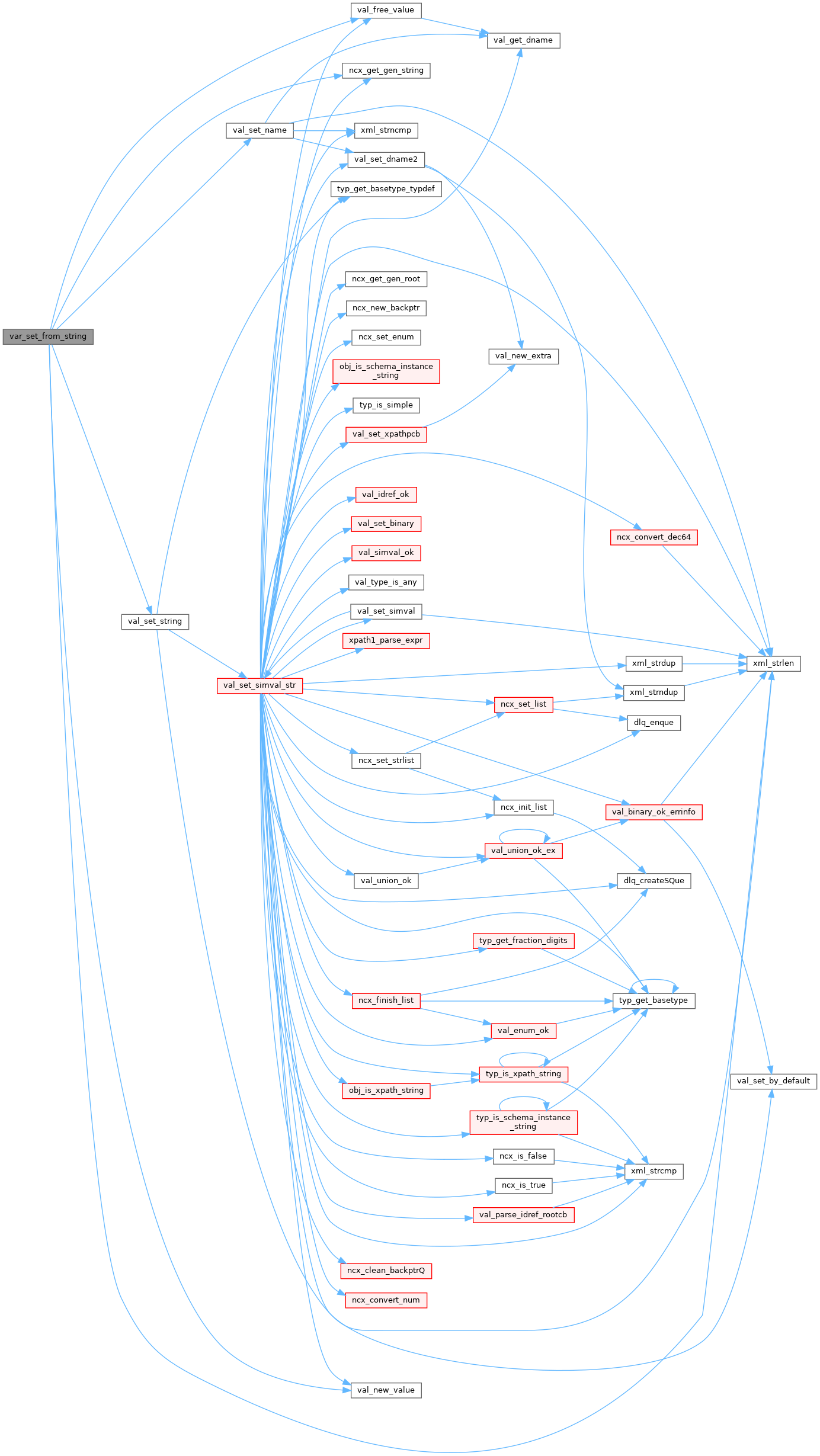
| void var_set_getvar_cb | ( | var_getvar_fn_t | getcb, |
| void * | cookie | ||
| ) |
Set the getvar callback function used for data templates.
| getcb | getvars callback function address |
| cookie | cookie parameter to pass to callback |
| status_t var_set_move | ( | runstack_context_t * | rcxt, |
| const xmlChar * | name, | ||
| uint32 | namelen, | ||
| var_type_t | vartype, | ||
| val_value_t * | value | ||
| ) |
Find and set (or create a new) global user variable.
Use the provided entry which will be freed later This function will not clone the value like var_set
| rcxt | runstack context to use to find the var |
| name | var name to set |
| namelen | length of name string |
| vartype | variable type |
| value | var value to set (pass off memory, do not clone!) |


| status_t var_set_move_que | ( | dlq_hdr_t * | varQ, |
| const xmlChar * | name, | ||
| val_value_t * | value | ||
| ) |
Find or create and set a Q-based user variable.
| varQ | variable binding Q to use instead of runstack |
| name | var name to set |
| value | == var value to set (pass off memory, do not clone!) |


| status_t var_set_move_que_global | ( | dlq_hdr_t * | varQ, |
| const xmlChar * | name, | ||
| val_value_t * | value | ||
| ) |
Find or create and set a Q-based user variable.
| varQ | variable binding Q to use instead of runstack |
| name | var name to set |
| value | == var value to set (pass off memory, do not clone!) |

| status_t var_set_que | ( | dlq_hdr_t * | varQ, |
| const xmlChar * | name, | ||
| const val_value_t * | value | ||
| ) |
Find and set (or create a new) Q-based user variable.
| varQ | variable binding Q to use instead of runstack |
| name | var name to set |
| value | var value to set |

| status_t var_set_str | ( | runstack_context_t * | rcxt, |
| const xmlChar * | name, | ||
| uint32 | namelen, | ||
| const val_value_t * | value, | ||
| var_type_t | vartype | ||
| ) |
Find and set (or create a new) global user variable.
| rcxt | runstack context to use to find the var |
| name | var name to set |
| namelen | length of name |
| value | var value to set |
| vartype | variable type |


| status_t var_set_str_que | ( | dlq_hdr_t * | varQ, |
| const xmlChar * | name, | ||
| uint32 | namelen, | ||
| const val_value_t * | value | ||
| ) |
Find and set (or create a new) global user variable.
| varQ | variable binding Q to use instead of runstack |
| name | var name to set |
| namelen | length of name |
| value | var value to set |


| status_t var_set_sys | ( | runstack_context_t * | rcxt, |
| const xmlChar * | name, | ||
| const val_value_t * | value | ||
| ) |
Find and set (or create a new) global system variable.
| rcxt | runstack context to use to find the var |
| name | var name to set |
| value | var value to set |

| boolean var_string_is_var_expr | ( | const xmlChar * | varstring, |
| uint32 | varlen, | ||
| boolean * | plainvar | ||
| ) |
Check if the string is a variable reference.
| varstring | string to check | |
| varlen | length of varstring to check | |
| [out] | plainvar | address of return flag
|

| status_t var_unset | ( | runstack_context_t * | rcxt, |
| const xmlChar * | name, | ||
| uint32 | namelen, | ||
| var_type_t | vartype | ||
| ) |
Find and remove a local or global user variable.
!!! This function does not try global if local fails !!!
| rcxt | runstack context to use to find the var |
| name | var name to set |
| namelen | length of name string |
| vartype | variable type |

| status_t var_unset_que | ( | dlq_hdr_t * | varQ, |
| const xmlChar * | name, | ||
| uint32 | namelen, | ||
| xmlns_id_t | nsid | ||
| ) |
Find and remove a Q-based user variable.
| varQ | Q of ncx_var_t to use |
| name | var name to set |
| namelen | length of name string |
| nsid | namespace ID to check if non-zero |